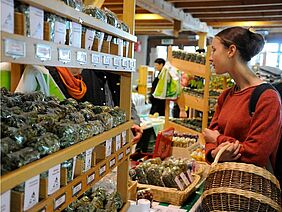The survey showed that the sustainability goal "Avoiding food waste" (SDG* 12.3) has the highest relevance among the Swiss population. Followed by the sustainability goals "Maintaining and strengthening local and short supply chains" (SDG 12.2, 2.4), "Reducing the use of chemical-synthetic pesticides" (SDG 12.4, 6.3) and "Conserve biodiversity" (SDG 15). More than 70% of the respondents agreed with the importance of these three topics in whole or in part. For the topic of food waste, it was even over 80%.
It is striking that the "reduction of the use of chemical-synthetic pesticides" is in third place. Within the Swiss population, support for "reducing the use of chemical-synthetic pesticides" increases with age and level of education. Among women, the sustainability goal has a significantly higher relevance than among men. At the same time, there are no statistically significant differences between urban and rural populations, German-speaking and French-speaking Switzerland, or individual cantons.
About the FiBL Organic Barometer
The FiBL Organic Barometer Switzerland (or ‘Biobarometer’) is a representative survey on the topics of organic consumption and sustainability that has been conducted regularly by the Research Institute of Organic Agriculture since 2016. It involves a survey of 1,000 people in French and German-speaking Switzerland. The aim of the study is to make current and future consumption trends and their changes visible over time. The full results of the organic barometer survey conducted between 30 November and 16 December 2020 are expected to be published in the third quarter of 2021 following a detailed analysis.
*SDG = Sustainable Development Goal
The number after the term "SDG" stands for the respective SDG to which the sub-goal examined in the Biobarometer is assigned.
Further information
Contact
- Hanna Stolz
- Seraina Kalchofner (for media inquiries)




